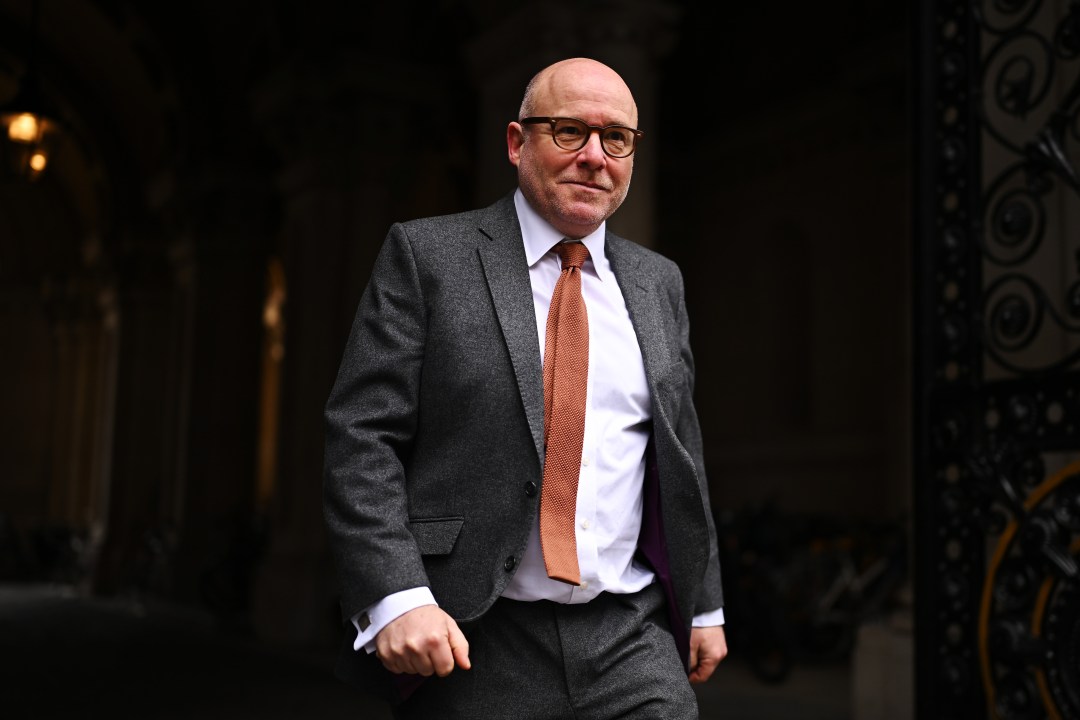Was the prosecution of Lucy Connolly in the public interest? That is the question now being asked of the embattled Attorney General, Richard Hermer, following my story in the Sunday Telegraph that Hermer approved the charge of stirring up racial hatred against the mother and childminder last summer, over a hastily deleted tweet on the night of the Southport attack. ‘Lord Hermer of Chagos’ has faced further questions over his political judgement and yet more calls for him to be sacked.
In their blinkered appeals to sentencing guidelines and legal procedures, these lawyers seem utterly deaf to the central political and moral question of whether someone should be liable to go to prison for seven years for a single tweet
With significant public outrage about Connolly’s case, Hermer will doubtless not be pleased that this connection has been made. Since Lucy lost her appeal against her 31-month sentence last month, meaning she will remain in prison until August, a fundraiser for her and family has nearly met its £150,000 goal such is the public sympathy with her plight.
Even still, parts of the legal profession have been attempting to justify her imprisonment. On the day Connolly’s sentence was upheld, I appeared on GB News opposite legal commentator Joshua Rozenberg. I was shocked when he denied that Lucy had been made an example of, stonily defending Connolly’s treatment on the grounds that ‘this is an offence for which the maximum sentence is seven years in prison’, as laid down by parliament.
Later that week on BBC Question Time, one audience member asked how it could be right that in the midst of a prison overcrowding crisis, Lucy Connolly will spend longer in prison than some of the members of a Telford grooming gang, four of whom received sentences of just 30 months in 2013 for convictions including child prostitution and having sex with a minor. On the panel, barrister Hashi Mohamed condescended that the comparison was a ‘misconception’ since the sentence had been handed down according to the guidelines – utterly missing the point about the outrageous double standard.
Last week Lord Sumption, the author and former Supreme Court judge, also threw his weight behind the prosecution, rubbishing claims that Connolly is a ‘political prisoner’ and declaring her rash tweet a ‘serious offence’, since it was seen many times on social media.
The criminal law is not hermetically sealed off from the real world and from what normal people think, nor should it be. In their blinkered appeals to sentencing guidelines and legal procedures, these lawyers seem utterly deaf to the central political and moral question of whether someone should be liable to go to prison for seven years for a single tweet. Under the Public Order Act 1986, any prosecution for stirring up racial hatred must be signed off by the Attorney General, both as a safeguard for free speech and to ensure such prosecutions are in the public interest. The charge was brought, and the sentencing guidelines were then applied – but should it have been?
It is rare for the Attorney General to refuse to give consent because, by the time it reaches their office, the Crown Prosecution Service will have itself determined that a successful prosecution is likely, it is understood. But Hermer had the constitutional power to decide differently. Suella Braverman, Conservative Attorney General between 2020 and 2022, said at the weekend that were Connolly’s case to have crossed her desk, she would not have given consent to prosecute. ‘The charges brought against [Connolly] were not in the public interest’, she said, and she questioned whether the ‘the costs and resources required to prosecute Lucy for her message were proportionate’ given the current pressures on prisons.
Connolly’s case is not the only draconian prosecution for stirring up racial hatred agreed by the AG last summer. Take former Royal Marine Jamie Michael, who in a Facebook video during the Southport unrest called for his local community to peacefully organise to prevent illegal migrants being settled in the Welsh Valleys. (Some of his language was ‘clumsy’, he later admitted, having described some illegal immigrants as ‘scumbags’ and ‘psychopaths’.) After he was reported to police by the office of a Labour Senedd member, Mr Michael was charged with intending to stir up racial hatred – which Hermer must have agreed to. Like Connolly, he was treated like a serious violent offender and remanded in custody, where he spent 17 days before finally securing bail.
In February, he went to trial, defended by the Free Speech Union, and when the jury retired to consider his case it took them just 17 minutes to find him not guilty. Lord Young, director of the Free Speech Union, told me: ‘Jamie Michael should never have been arrested for his Facebook post, let alone charged with an offence that could mean seven years in jail. It beggars belief that the Attorney General signed off on his prosecution. By unanimously acquitting in 17 minutes the jury was sending a message to Lord Hermer: stop wasting everyone’s time with these vexatious, politically motivated prosecutions.’
The only other defendant charged with stirring up racial hatred during the Southport unrest to appear before a jury, former prison officer Mark Heath, was also acquitted. The jury accepted his argument that he was simply expressing his ‘strong views’ in his series of anti-immigration social media posts and was not attempting to stir up violence – even if Hermer apparently disagreed by approving the prosecution. Lucy Connolly likewise stood a strong chance of being acquitted by a jury and was advised to plead not guilty by the Free Speech Union. But, denied bail and facing months in prison waiting for a trial, the mother and childminder pleaded guilty, believing it would be the quickest way to be reunited with her 12-year-old daughter.
In total, the AG’s office consented to 17 prosecutions of stirring up racial hatred in connection to the Southport disorder. To be clear, not all of these prosecutions seem so obviously misconceived. Tyler Kay, for instance, wrote posts inciting action against specific immigration solicitors in Northampton as well as asylum hotels while riots were ongoing, which would seem to meet the definition of direct and explicit incitement. (Even still, many will find his 38-month sentence disproportionate given that people received less for actual rioting.)
But what has always troubled observers of the Southport crackdown is the sense that the government, following Sir Keir Starmer’s political narrative about what was causing the riots, decided to indiscriminately throw the book at people over online speech. Hermer himself boasted after individuals were jailed that this served as ‘a stark warning that you cannot hide behind your keyboard’. Nitpicking lawyers and Labour cheerleaders might insist there was nothing political to this whatsoever – that it was just the ‘independent’ justice system functioning as it normally would. But it now seems – if it wasn’t clear already – that explicit political decisions were indeed involved.
One can also criticise the CPS for bringing the case against Connolly, and the fact that she was cruelly held on remand. But it’s crucial to remember that all this could have been nipped in the bud at the say-so of the Attorney General. Lucy Connolly is in prison today because Richard Hermer decided that it was in the public interest for her to be prosecuted in the first place. This prosecution was undoubtedly political.








Comments